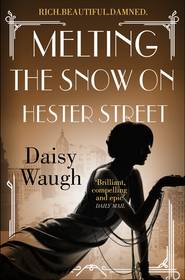По всем вопросам обращайтесь на: info@litportal.ru
(©) 2003-2024.
✖
Last Dance with Valentino
Автор
Год написания книги
2018
Настройки чтения
Размер шрифта
Высота строк
Поля
‘Only promise me,’ he said, pulling away, ‘promise you’ll keep in touch?’
But the kiss was still working its magic. My mind wasn’t there. I laughed at him. ‘Keep in touch?’ I repeated. ‘Rudy, I’m not going anywhere. What can you mean?’
It was then he took the pin from his collar, a small gold pin. He gave it to me. ‘Look after it, will you?’ he said. ‘I brought it all the way from Italy.’ I have it still, of course. I have looked after it ever since.
Retaliation came curving back before we’d even plucked ourselves up from the floor. Mrs de Saulles sent a message to the nursery barely half a minute later, via Madeleine, who arrived looking as if she’d been through a hurricane. She tapped on the door, saw us seated there, closer than we might have been, his hand on my bare arm, but she didn’t even snigger. Rudy was to go to the hall and wait there, alone, she told us, until Hademak returned from his errands. As soon as he returned, he would be leaving at once to drive them both – Mrs de Saulles and Rudy – to the train station.
I never saw Rudy at The Box again.
Later that afternoon, after she had reached New York, Mrs de Saulles sent a message via Hademak, ordering my father to pack up his belongings. She said she wanted him out of the house by nightfall.
Poor Papa. Poor, stupid man. We overheard him – the entire household overheard him – bawling at Hademak, the pair of them as lovestruck and as broken as each other. And yet he bawled as if his exile were all Mr Hademak’s fault.
‘You think I don’t know your game?’ Papa was roaring, and upstairs, alone in my bedroom, I’m sorry to say I winced for him. ‘You think I don’t see you wheedling away, gazing at your mistress like a Goddamn puppy dog? You think she and I don’t laugh at you? We laugh every time you have left the room! And now, the moment her back is turned, you try to oust me – but you can’t win! You can’t win, you filthy Swedish wheedler . . . ’ Why, he suddenly declared, only that morning he and Mrs de Saulles had been contemplating running away together to Chile. Or Uruguay. Or London . . . ‘You can’t stamp on a love like ours with your filthy Swedish wheedling. Eh? Ha! Get out of here! Get out of my sight before I have you fired. Get out!’
Hademak came knocking at my door. He stood there, his head stooped to fit beneath the frame, a great giant of a man, and he was shaking like a leaf. ‘Your father doesn’t listen,’ he said to me. ‘He thinks I am guilty with some terrible plan. But he has to leave immediately. At once. This afternoon . . . Mrs de Saulles won’t tolerate to have him in the house.’
‘But why? Why him? Why not me? What has he done?’
‘She has complained to Mr de Saulles that – he has performed inappropriate and, er, unwelcome approaches towards her, and, er . . . ’ he couldn’t bring himself to look at me ‘ . . . Mr de Saulles iss . . . enthusiastic to telephone the sheriff.’
‘What?’
He shrugged – a tiny little shrug, for such enormous shoulders. ‘Madame is . . . most unhappy. Your father has to leave us at once, or I have been ordered to telephone Sheriff Withers.’
‘But to leave for where? Where is he to go?’
‘I am to give him two hundred dollars for his art and then I must drive him to the train station . . . Your papa iss insisted on taking his art with him. But I have been told to order him . . . that the money is only when he leaves the art behind.’ Mr Hademak’s English seemed to deteriorate, the more distressed he became. ‘He must leave it all behind, and go out at once. Can you explain to him? . . . I am ssorry, Jennifer . . . I can direct him with an excellent boarding-house in the city . . . It is cheap . . . ’
There was little choice. Father could leave for the city with two hundred dollars or he could be arrested and leave without a cent for Mineola jail. Either way, we all knew there was no possibility of Mrs de Saulles relenting. He had to go at once.
Sadly, I agreed I would go to talk to him. I told Mr Hademak that I would pack up my own things first, to give my father a few moments to collect himself.
‘Absolutely not!’ Mr Hademak cried. ‘Under no account. You are under the orders to stay here with the Little Man. In fact, in the telephone call to me, Mrs de Saulles made it quite clearly – the money I will give to your father is only depending on three things: first one, he leaves in this moment; second one, that he leaves all his workings and sketches behind; and third one, that you remain here at The Box, with the Little Man. You understand, Mrs de Saulles,’ he added shyly, ‘is well aware of his very strong fondness for you. She is determined about hating to break that little heart of his.’
‘It has nothing to do with it!’ I retorted – for I was never in any doubt. ‘She wants me here to keep me apart from Rudy!’
‘Not at all.’ He didn’t look at me. ‘Not at all.’
‘But I can’t stay, Mr Hademak! Not without Papa!’
‘You must.’
‘Perhaps I could look after the boy in New York, when he’s with his father. I should love to do that. Couldn’t I do that?’
‘Not,’ said Mr Hademak, shaking his head. I knew it in any case.
‘But I could at least meet him there. Often.’
‘Not,’ said Mr Hademak again. ‘It is forbidden. The moment you are leaving here you not be seeing the Little Man again.’
‘But, Mr Hademak – my father! He can’t survive on his own. Not in New York! What will he do?’
‘Without money, you shall neither one nor two of you manage in surviving here or in New York or anywhere in this big country . . . I am sso ssorry, Jennifer. But there it is the story ... He must leave, and you must sstay, and that is for your best survival, father and daughter both.’
And so it was. An hour later, Hademak drove Papa through the cold winter rain to the train station. I came along too, but only to wave him goodbye. Papa didn’t speak the entire journey. He sat silently, submissively, crestfallen and quite bewildered, his hands shaking – an old man and a disgraced schoolboy at once. He looked terrified.
‘You’ll be all right,’ I said to him as we waited on the station platform together. (Mr Hademak had tactfully stayed in the car.) ‘Mr Guglielmi will help you, I’m certain of it. Mr Hademak has given you his address, hasn’t he? And you know where it is? Don’t forget – you have it in your wallet. Promise me you will contact him as soon as you arrive. Promise me!’
Papa promised, but I didn’t believe him. He climbed onto the train.
‘And you have the address of the boarding-house?’ I called after him. ‘And Mr Hademak says you can walk to it from the station. From Pennsylvania station. It’s very easy, he says . . . Or you can take a taxicab . . . You have cash for a cab?’ I was crying by then, couldn’t stop myself. There were tears on my cheeks, and he turned back and looked at them, then up at me; and with an effort that was truly painful to see, he stretched his mouth into a form of smile.
‘Don’t you worry!’ he cried, with not even a trace of light; a parody of his old self. ‘I shall be absolutely fine! . . . Looking forward enormously to a spell in the big city. Isn’t life a grand adventure? And Mr Guglielmi shall show me the way! No, it will be quite marvellous. Jolly good fun! No doubt about it at all!’
He blew me a kiss, and I watched him stumbling away to his seat, and I think I knew then that he was done. Finished. Gone. The charm was gone. The fight had gone. As the train rolled out of the station, I was weeping so profusely I couldn’t see or hear when it finally departed.
After that I don’t know what happened, or how, or why, but it was written in the paper a few days later that Mr and Mrs de Saulles were to divorce, and that a hearing had been set a month or so hence.
Mrs de Saulles and Jack, Mr Hademak, Madeleine and one or two others, myself included, moved from The Box to a smaller cottage in the village of Roslyn, just a few miles down the road. I wanted to take the typewriter with me, but Mr Hademak forbade it. He said the noise, in a smaller house, would upset his mistress. But he was a kind man. He used to take me to the train station early each Sunday morning so I could spend the day with my father in the city. And other than that, life continued pretty much as it had before. Except there was no Rudy. And each week there were the Sundays. I spent most of the week worrying what would become of my father while I was away from him, but I’m afraid I used to dread those Sundays.
Somehow, some half-remembered instinct for his own survival had guided my father on the journey from Penn Station to the boarding-house Mr Hademak had recommended. But after that, which I suppose must have been a gargantuan effort, he was clearly exhausted. It was three days before I was first able to visit him, and when I arrived he was still in the clothes he had been wearing when he had left The Box. From the greyness of his skin, and the dreadful hollows beneath his eyes and cheekbones, it was obvious that my once handsome, talented papa had neither slept nor eaten.
His room was small and grubby, on the fifth floor of a gloomy dilapidated building on East 39th. It had a gas stove in the corner, which he never learned to use, but which I did – to cook him food he never ate – and a single bed. On the first floor there was a small washroom, shared by forty or so residents, with water that ran only intermittently. And that was it. Papa’s home.
His materials lay stacked against one corner, by the door, where I suppose he had dropped them on the day he arrived, and beside them his suitcase, which, without me, would have remained packed for ever.
He lived there for about four months in all – and did nothing. He sat on that bed beside the window, gazed out onto the street, and he drank. First he drank through the money given him by the de Saulles, and then he drank through the money I delivered to him from my wages each week. Poor wretched man.
That twenty-minute walk across midtown to Papa’s boarding-house was, for some time, all I managed to see of the great city of New York. And in truth I used to walk it with feet that pulled me in any direction but the one I was meant to go. I would zigzag the blocks, sucking in the magical, frenetic activity, awestruck by those long, wide, endless avenues, the shameless gleam of the new buildings, the glorious chaos of the building sites, and the crowded ramshackle stores; the foreign voices, the steaming food stands, and the autos, and the horses, the newspaper boys and the boot boys – the heaving, exhilarating mass of striving, shouting humankind. I still adore it, even now, in this August heat. Back then, when it was so new to me, so unlike the greyness of war-bowed London, or the neurotic silence of Roslyn, it made my spirits soar. I would draw out that short journey for as long as I dared, before guilt at the pleasure I was taking and worry for my poor father overcame me.
I did abscond, just once, with Madeleine’s encouragement (though she couldn’t come herself: even on her day off, Mrs de Saulles would never allow her to stray beyond Westbury). We planned it together, my little escape.
It was only for an hour. I walked across town, as I always did – gazing this way and that, as I always did – as far as East 39th, and then continued another three blocks to the Rialto on 42nd. Rudy had described it to me in detail, and I had read about it, too. It had only been open a few months. The papers – and Rudy, too – insisted it was the grandest, largest, most fabulous, movie theatre in all the world.
I had watched movies before, of course; any number of unmemorable five-reelers in dismal little halls back in Chelsea. Three or four times Madeleine and I had visited the picture house in Westbury, too. But this was like entering another world. Intolerance was playing – what good fortune was that? To see the most extravagant film in the history of film-making in the most extravagant movie theatre in the history of movie theatres! I watched it – the first half – and I was spellbound. As we all are, of course, when first we see it. I would have liked to stay to the end and watch it again, and again, and possibly spend the rest of my life in there, staring at that cinema screen. But after a while the image, though I tried to banish it, of my papa gazing listlessly out of his window, all alone, burned through even D. W. Griffith’s most extravagant depictions, and I had to go.
I ran all the way to his boarding house – arrived at his door breathless, full of excitement. And before his melancholy overcame us both, I tried to pass on a little of the magic: I described to him, before even I had sat down, the Rialto’s vaulted golden ceiling, and the row upon row of gilt and velvet chairs. I told him about the spotlights that danced in time to the music on either side of the enormous cinema screen, and of the golden organ sound which filled every corner of that massive space. I told him of the phenomenal, unimaginable tricks of Mr Griffith’s camera – the ‘close-ups’ on actors’ faces, magnified so as to fill the entire screen, allowing the audience to read every flicker of their smallest emotion. I told him about the ghostly superimposing of one image upon another, the different-coloured tints – sepia, blue, amber – all the tricks which Mr Griffith used to tell his story; and of the live elephants in his Babylon, and of the thousands upon thousands of extras and of the sheer, extraordinary scale of the film, and the theatre, and the wonderful, beautiful world just waiting to be discovered outside his window . . . I tried my best. I did. I tried to lure him back to the Rialto to watch the film with me.
God knows what miracle I had been hoping for. Of course he wouldn’t come. He wouldn’t have done so before, when he was still well. Papa belonged to the generation who believed that movies were designed for the degenerate masses, not for him – and most certainly not for his daughter.
By then, in any case, Papa never left his room – except, I suppose, to stock up on liquor, since he seemed never to run out. Often, when I came to see him, he wouldn’t talk to me. When he did, when he volunteered any comment at all, it was almost only in relation to Mrs de Saulles.
Was she well?
No.
Did she speak of him?











